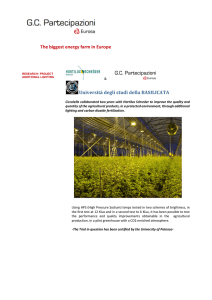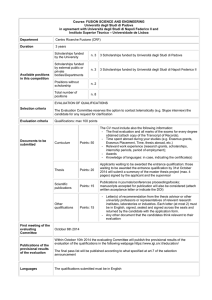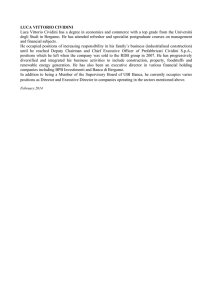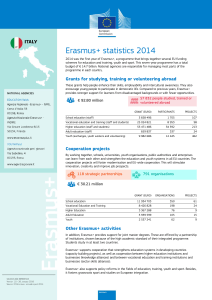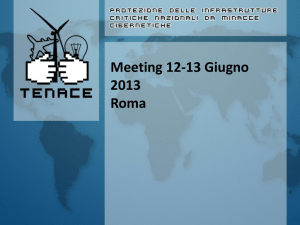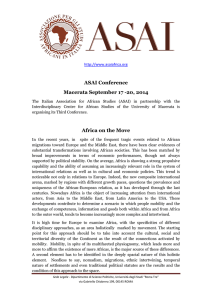Presentation of the journal Nazioni e Regioni – Studi e Ricerche
advertisement
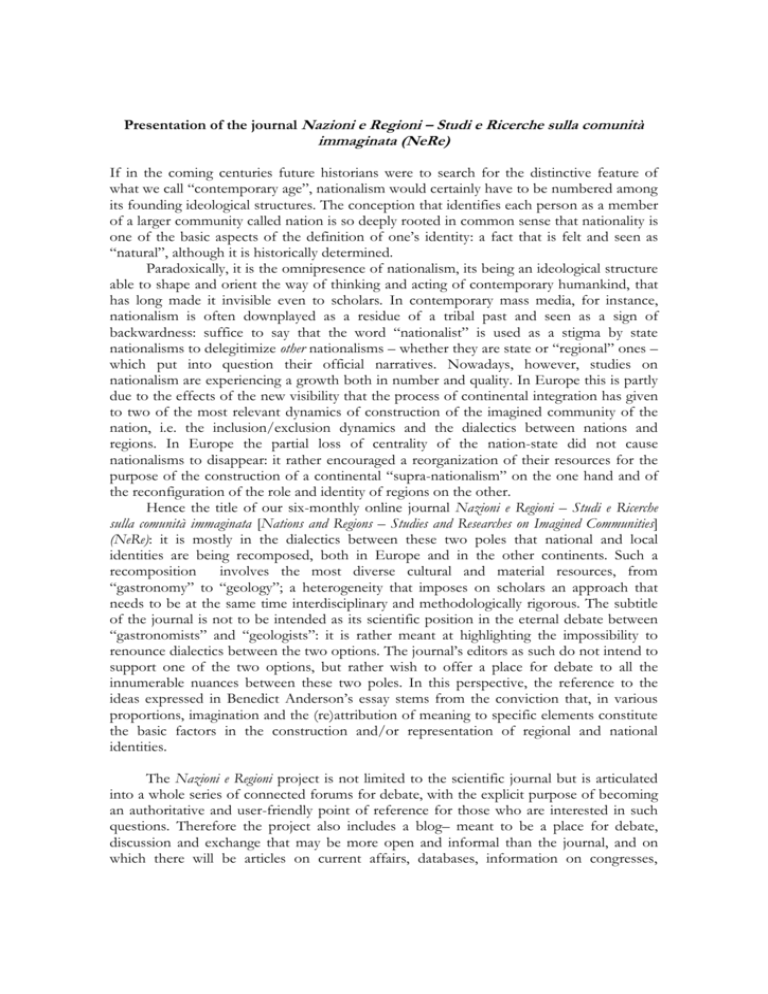
Presentation of the journal Nazioni e Regioni – Studi e Ricerche sulla comunità immaginata (NeRe) If in the coming centuries future historians were to search for the distinctive feature of what we call “contemporary age”, nationalism would certainly have to be numbered among its founding ideological structures. The conception that identifies each person as a member of a larger community called nation is so deeply rooted in common sense that nationality is one of the basic aspects of the definition of one’s identity: a fact that is felt and seen as “natural”, although it is historically determined. Paradoxically, it is the omnipresence of nationalism, its being an ideological structure able to shape and orient the way of thinking and acting of contemporary humankind, that has long made it invisible even to scholars. In contemporary mass media, for instance, nationalism is often downplayed as a residue of a tribal past and seen as a sign of backwardness: suffice to say that the word “nationalist” is used as a stigma by state nationalisms to delegitimize other nationalisms – whether they are state or “regional” ones – which put into question their official narratives. Nowadays, however, studies on nationalism are experiencing a growth both in number and quality. In Europe this is partly due to the effects of the new visibility that the process of continental integration has given to two of the most relevant dynamics of construction of the imagined community of the nation, i.e. the inclusion/exclusion dynamics and the dialectics between nations and regions. In Europe the partial loss of centrality of the nation-state did not cause nationalisms to disappear: it rather encouraged a reorganization of their resources for the purpose of the construction of a continental “supra-nationalism” on the one hand and of the reconfiguration of the role and identity of regions on the other. Hence the title of our six-monthly online journal Nazioni e Regioni – Studi e Ricerche sulla comunità immaginata [Nations and Regions – Studies and Researches on Imagined Communities] (NeRe): it is mostly in the dialectics between these two poles that national and local identities are being recomposed, both in Europe and in the other continents. Such a recomposition involves the most diverse cultural and material resources, from “gastronomy” to “geology”; a heterogeneity that imposes on scholars an approach that needs to be at the same time interdisciplinary and methodologically rigorous. The subtitle of the journal is not to be intended as its scientific position in the eternal debate between “gastronomists” and “geologists”: it is rather meant at highlighting the impossibility to renounce dialectics between the two options. The journal’s editors as such do not intend to support one of the two options, but rather wish to offer a place for debate to all the innumerable nuances between these two poles. In this perspective, the reference to the ideas expressed in Benedict Anderson’s essay stems from the conviction that, in various proportions, imagination and the (re)attribution of meaning to specific elements constitute the basic factors in the construction and/or representation of regional and national identities. The Nazioni e Regioni project is not limited to the scientific journal but is articulated into a whole series of connected forums for debate, with the explicit purpose of becoming an authoritative and user-friendly point of reference for those who are interested in such questions. Therefore the project also includes a blog– meant to be a place for debate, discussion and exchange that may be more open and informal than the journal, and on which there will be articles on current affairs, databases, information on congresses, conferences and seminars – and a book series in which we shall publish PhD theses and unpublished monographs on questions related to regionalisms and nationalisms and translations into Italian of relevant studies on nations and nationalisms. THE JOURNAL Nazioni e Regioni (NeRe) has seen the light thanks to a young and go-ahead publishing house located in Bari (Italy), Caratteri Mobili, and to three researchers that have explored the questions related to nationalism from different angles: Andrea Geniola, PhD in Contemporary Philosophies and Social Theories at Università degli Studi di Bari “Aldo Moro”, DEA in Comparative History at Universitat Autònoma de Barcelona and CEFIDUAB’s member; Dario Ansel, PhD in History, Politics and Representation of Interests in Italian and International Society at Università degli Studi di Teramo; Fabio De Leonardis, PhD in Theory of Language and Sciences of Signs at Università degli Studi di Bari “Aldo Moro” and MA in Russian and Eurasian Studies and Political Science at the European University at St. Petersburg. This new journal is meant to be an open and interdisciplinary place that, in the wake of the successful experience of similar journals in English-speaking countries, intends to encourage work in a research field which is still marginal in Italy’s and Europe’s scientific production, thus giving the possibility to scholars interested in nationalism to publish the results of their enquiries and enter a debate with other scholars. Despite being published only in Italian, Nazioni e Regioni aims at having an international public, therefore it will accept contributions in various languages (in particular, Italian, English, Spanish, French, Russian, Catalan) that will subsequently be translated into Italian by the editors. We accept contributions that analyze theoretical questions related to nationalism and regionalism, enquiries on the current situation of the study of specific cases, researches on concrete aspects of national construction analyzed from different scientific angles. Nazioni e Regioni is a six-monthly online journal; we will also publish a printed issue with a selection of the best articles published during the previous year. Such selection will be made by ‘anonymous’ readers, with the editorial committee obviously keeping the last word in case of divergence on the opportunity of publishing an article. Although the journal’s subtitle, Studies and Researches on Imagined Communities, makes clear where the editorial staff stands in the debate on the theory of nation, Nazioni e Regioni is opened to contributions that question such point of view. The journal’s position before conflicting evaluations will be based solely on considerations over the cultural value of the disputed article; the latter, apart from considerations about the subject, will eventually be valued on the basis of its scientific coherence and the rigour of its claims. <DATI RIVISTA> Nazioni e Regioni – Studi e ricerche sulla comunità immaginata ISSN: 2282-5681 Editors Dario Ansel, Fabio De Leonardis, Andrea Geniola. Editorial Staff Dario Ansel, Adriano Cirulli, Fabio De Leonardis, Andrea Geniola, Marco Laurenzano, Arcangelo Licinio, Paolo Perri, Franciscu Sedda, Francesca Zantedeschi. Scientific Committee Joseba Agirreazkuenaga (Euskal Herriko Unibertsitatea), Igor Ahedo (Euskal Herriko Unibertsitatea), Ferran Archilés (Universitat de València), Leyre Arrieta (Universidad de Deusto), Xacobe Bastida (Universidad de Oviedo), Alfonso Botti (Università degli Studi di Modena), Jordi Canal (École des Hautes Études en Sciences Sociales-Paris), Giovanni Cattini (Universitat de Barcelona), Maarten Van Ginderachter (Universiteit Antwerpen), Arnau Gonzàlez Vilalta (Universitat Autònoma de Barcelona), José Luis de la Granja (Euskal Herriko Unibertsitatea), Michel Huysseune (Vesalius College, Vrije Universiteit Brussel), Francisco Letamendia (Euskal Herriko Unibertsitatea), Emilio Majuelo (Universidad Pública de Navarra), Juan Carlos Moreno Cabrera (Universidad Autónoma de Madrid), Isidoro Mortellaro (Università degli Studi di Bari “Aldo Moro”), Xosé Manoel Núñez Seixas (Universidade de Santiago de Compostela/Ludwig-Maximilians-Universität München), Daniele Petrosino (Università degli Studi di Bari “Aldo Moro”), Anne-Marie Thiesse (École Normale Supérieure – Paris), Maarten Van Ginderachter (Universiteit Antwerpen), Pere Ysàs (Universitat Autònoma de Barcelona). THE BLOG Among the initiatives that have been added to the journal Nazioni e Regioni – Studi e ricerche sulla comunità immaginata and ideally complete it, we have set up a blog that aims at rendering public all that may be related to the subject of the journal. The blog section, in the left column of the homepage, is divided into three areas of interest: editorial news, calls for papers and external contributions. The latter is meant at relating in a dialectic way different interests and points of view on national and regional questions, whether they originated in current affairs or in the reading of the essays published in the journal. You can receive all the updates from the blog and the project in general by subscribing to the mailing list or to NeRe’s Twitter an Facebook accounts. The Editors nazionieregioni@gmail.com
